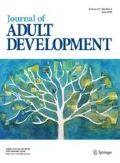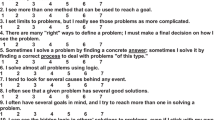Abstract
This is a report of four studies extending research on Complex Postformal Thought using the Postformal Thought Scale (PTS) (Sinnott 1998a, b). In Study I PTS was studied in relation to personality as conceptualized in the NEO Five Factor Model. Data from 82 participants indicated that PTS is significantly related to the Openness to Experience and the Conscientiousness factors of the NEO. In Study II PTS was examined in relation to the Concept of God Scale to answer the question whether postformal and non-postformal respondents were likely to hold different god concepts. Data from 50 participants indicated no relationship between the two measures. In Study III PTS was examined in relation to political opinions using the newly created Political Opinion Survey. Data from 50 participants demonstrated no relation between the two tests. In Study IV PTS was studied in relation to the Attitudes Toward Lesbians and Gay Men Scale. Data from 112 participants indicated that PTS was related to positive attitudes toward lesbians and gay men. Current conceptualizations of PTS development are used to interpret these findings.
Similar content being viewed by others
References
Cartwright, K. D. (2001). Cognitive development theory and spiritual development. Journal of Adult Development, 8(4), 213–220.
Cartwright, K. B., Galupo, M. P., Tyree, S. D., & Jennings, J. G. (2009). Reliability and validity of the Complex Postformal Thought Questionnaire: Assessing adults’ cognitive development. Journal of Adult Development, this issue, doi:10.1007/s10804-009-9055-1.
Costa, P. T., & McCrae, R. R. (1985). The NEO personality inventory manual. Odessa, FL: Psychological Assessment Resources.
Costa, P. T., & McCrae, R. R. (1992). NEO PI-R professional manual. Odessa, FL: Psychological Assessment Resources.
Costa, P. T., & McCrae, R. R. (2006). Age changes in personality and their origins: Comment on Roberts, Walton, and Viechtbauer (2006). Psychological Bulletin, 132(1), 26–28.
Galupo, M. P., Cartwright, K. B., & Savage, L. S. (in press). Cross-category friendships as a context for postformal cognitive development. Journal of Adult Development.
Gavin, J. L., Galupo, M. P., & Cartwright, K. B. (in press). The role of postformal cognitive development in death acceptance. Journal of Adult Development.
Gough, H. G., & Heilbrun, A. B., Jr. (1965). The Adjective Checklist manual. Palo Alto, CA: Consulting Psychologist.
Herek, G. M. (1988). Heterosexuals’ attitudes toward lesbian and gay men: Correlates and gender differences. The Journal of Sex Research, 25(4), 451–477.
Herek, G. M. (2007). Confronting sexual stigma and prejudice: Theory and practice. Journal of Social Issues, 63(4), 905–925.
Johnson, L. (1991). Bridging paradigms: The role of a change agent in an international technical transfer project. In J. Sinnott & J. Cavanaugh (Eds.), Bridging paradigms: Positive development in adulthood and cognitive aging (pp. 59–72). New York: Praeger.
Johnson, L. (1994). Nonformal adult learning in international development projects. In J. D. Sinnott (Ed.), Interdisciplinary handbook of adult lifespan learning (pp. 203–217). Connecticut: Greenwood Press.
Johnson, L. (2004). Postformal thinking in the workplace. Invited monograph. Stockholm, Sweden: University of Stockholm.
Kavathatzopoulos, I., & Rigas, G. (1998). A Piagetian scale for the measurement of ethical competence in politics. Educational and Psychological Measurement, 58(5), 791–803.
Morton, K. R., Worthley, J. S., Nitch, S. R., Lamberton, H. H., Loo, L. K., & Testerman, J. K. (2000). Integration of cognition and emotion: A postformal operations model of patient–physician interaction. Journal of Adult Development, 7(3), 151–160.
Ray, P. H., & Anderson, S. R. (2000). The cultural creatives: How 50 million people are changing the world. New York: Three Rivers Press.
Rogers, D. R. B. (1989). The effect of dyadic interaction and marital adjustment on cognitive performance in everyday logical problem solving. Doctoral dissertation, Logan: Utah State University.
Rogers, D., Sinnott, J., & Van Dusen, L. (1991). Marital adjustment and social cognitive performance in everyday logical problem solving. Paper presented at the Sixth Adult Development Conference, Boston.
Sinnott, J. D. (1981). The theory of relativity: A metatheory for development? Human Development, 24, 293–311.
Sinnott, J. D. (1984). Postformal reasoning: The relativistic stage. In M. Commons, F. Richards, & C. Armon (Eds.), Beyond formal operations (pp. 298–325). New York: Praeger.
Sinnott, J. D. (1989). Lifespan relativistic postformal thought. In M. Commons, J. Sinnott, F. Richards, & C. Armon (Eds.), Beyond formal operations I (pp. 239–278). New York: Praeger.
Sinnott, J. D. (1991a). Limits to problem solving: Emotion, intention, goal clarity, health, and other factors in Postformal thought. In J. D. Sinnott & J. Cavanaugh (Eds.), Bridging paradigms: Positive development in adulthood and cognitive aging. New York: Praeger.
Sinnott, J. D. (1991b). What do we do to help John? A case study of everyday problem solving in a family making decisions about an acutely psychotic member. In J. D. Sinnott & J. Cavanaugh (Eds.), Bridging paradigms: Positive development in adulthood and cognitive aging (pp. 203–220). New York: Praeger.
Sinnott, J. D. (1993). Use of complex thought and resolving intragroup conflicts: A means to conscious adult development in the workplace. In J. Demick & P. M. Miller (Eds.), Development in the workplace (pp. 155–175). Hillsdale, NJ: Erlbaum.
Sinnott, J. D. (1994a). Development and yearning: Cognitive aspects of spiritual development. Journal of Adult Development, 1, 91–99.
Sinnott, J. D. (1994b). Interdisciplinary handbook of adult life span learning. Westport, CT: Greenwood.
Sinnott, J. D. (1996). The development of complex reasoning: Postformal thought. In F. Blanchard-Fields & T. Hess (Eds.), Perspectives on cognitive change in adulthood and aging. New York: McGraw-Hill.
Sinnott, J. D. (1997). Brief report: Complex postformal thought in skilled research administrators. Journal of Adult Development, 4(1), 45–53.
Sinnott, J. D. (1998a). Creativity and Postformal Thought. In C. Adams-Price (Ed.), Creativity and aging: Theoretical and empirical approaches. New York: Springer.
Sinnott, J. D. (1998b). The development of logic in adulthood: Postformal thought and its applications. In Jack. Demick (Ed.), Plenum series on adult development. New York: Plenum.
Sinnott, J. D. (2000). Cognitive aspects of unitative states: Spiritual self-realization, intimacy, and knowing the unknowable. In M. E. Miller & A. N. West (Eds.), Spirituality, ethics, and relationship in adulthood: Clinical and theoretical explorations (pp. 177–198). Madison, CN: Psychosocial Press.
Sinnott, J. D. (2002). Postformal thought and adult development: Living in balance. In J. Demick & C. Andreoletti (Eds.), Adult development. New York: Plenum.
Sinnott, J. D. (2003). Teaching as nourishment for complex thought. In N. L. Diekelmann (Ed.), Teaching the practitioners of care: New pedagogies for the health professions. Interpretive studies in healthcare and the human services series (pp. 232–271). Madison, WI: University of Wisconsin Press.
Sinnott, J. D. (2004a). Learning as a humanistic dialogue with reality; new theories that help us teach the whole person: Context of learning and complex thought: Implications for modern life. Invited monograph. Stockholm, Sweden: University of Stockholm.
Sinnott, J. D. (2004b). Learning as a humanistic dialogue with reality; new theories that help us teach the whole person: Complex postformal thought and its relation to adult learning, life span development, and the new sciences. Invited monograph. Stockholm, Sweden: University of Stockholm.
Sinnott, J. D. (2005). The dance of the transforming self: Both feelings of connection and complex thought are needed for learning. In M. A. Wolf (Ed.), Adulthood: New terrain (pp. 27–37). San Francisco, CA: Jossey-Bass.
Sinnott, J. D. (2006). Spirituality as “feeling connected with the transcendent”: Outline of a transpersonal psychology of adult development of self. Religion, Spirituality, and the Scientific Study of Religion, 16, 287–308.
Sinnott, J. D. (2008a). Cognitive and representation development in adults. In K. B. Cartwright (Ed.), Literacy processes: Cognitive flexibility in learning and teaching (pp. 42–70). New York: Guilford Press.
Sinnott, J. D. (2008b). Humanistic psychology, learning, and teaching the “whole person”. I-manager’s Journal of Educational Psychology, 1(4), 55–63.
Sinnott, J. D. (2009). Cognitive development as the dance of adaptive transformation. In M. C. Smith (Ed.), Handbook of research on adult development and learning (pp. 103–134). London: Routledge/Taylor and Francis.
Sinnott, J. D. (in press). Coherent themes: Individuals’ relationships with God, their early childhood experiences, their bonds with significant others, and their relational delusions during psychotic episodes all have similar holistic, existential and relational themes. Journal of Adult Development.
Sinnott, J. D. (March, 2004a). Feeling connected, spirituality, and adult development: A new theory of their interrelationships. Invited paper presented at the Annual Conference on Research and Spirituality, Loyola College, Columbia, MD.
Sinnott, J. D., & Berlanstein, D. (2006). The importance of feeling whole: Learning to “feel connected”, community, and adult development. In C. H. Hoare (Ed.), Oxford handbook of adult development and learning. New York: Oxford University Press.
Sinnott, J. D., & Cavanaugh, J. (Eds.). (1991). Bridging paradigms: Positive development in adulthood and cognitive aging. New York: Praeger.
Sinnott, J. D., & Johnson, L. (1996). Reinventing the university: A radical proposal for a problem focused university. NJ: Ablex.
Yan, B. (1995). Nonabsolute/relativistic (N/R) thinking: A possible unifying commonality underlying models of postformal reasoning. Unpublished PHD dissertation, University of British Columbia, Vancouver.
Yan, B., & Arlin, P. K. (1995). Nonabsolute/relativistic thinking: A common factor underlying models of postformal reasoning? Journal of Adult Development, 2, 223–240.
Author information
Authors and Affiliations
Corresponding author
Rights and permissions
About this article
Cite this article
Griffin, J., Gooding, S., Semesky, M. et al. Four Brief Studies of Relations Between Postformal Thought and Non-Cognitive Factors: Personality, Concepts of God, Political Opinions, and Social Attitudes. J Adult Dev 16, 173–182 (2009). https://doi.org/10.1007/s10804-009-9056-0
Published:
Issue Date:
DOI: https://doi.org/10.1007/s10804-009-9056-0



